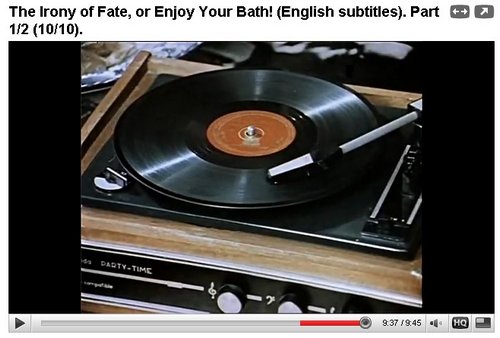I still haven’t worked up enough nerve to finish watching Voditel dlya Very. Instead I took in something easy and watched parts of Ironya Sudba.
I’ve watched it a few times already, but this time something caught my eye just a few seconds from the end of Part One.
In most of the Eldar Ryazanov films I’ve seen, he works something about western communication technology into the film. In Vokzal dlya Voikh (1982) it was a VCR player. In Sluzhebnyy roman it was a built-in 8-track player in a car. In these two films, the items were shown as if some new technology was being introduced to the viewers. In Beregis Avtomobilya the bad guy helped obtain a western tape player (if I remember correctly) on the black market, because the customer said a Soviet one wouldn’t do.
Ryazanov has made a lot more films than that, most of which I have not seen. So I don’t know if this is a theme that recurs throughout. Until I saw the above screenshot in Ironya Sudba, I thought it might be an exception. But the close-up of the phonograph turntable shows the English words “Party-Time.”
Why an American (or English) phonograph in a film in which Barbara Brylska had her voice dubbed because it wasn’t Russian enough? I presume that in 1971 there were Russian phonographs, too. Is Ryazanov playing a little game with us?
Google hasn’t helped me learn much about Party-Time phonographs, btw. I’ve found a few that are sold as collectors items, but they look cheaper than the one shown in the film. It’s not a brand name that I recall ever paying attention to.
